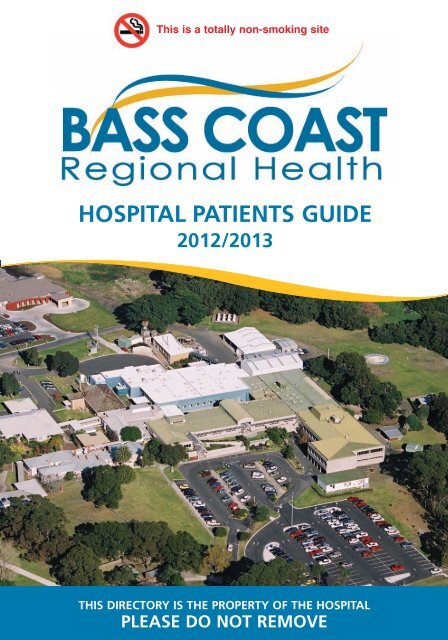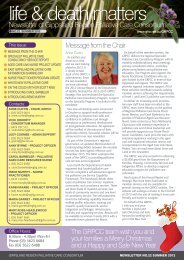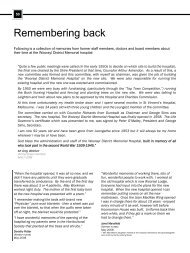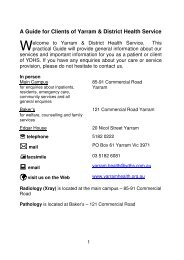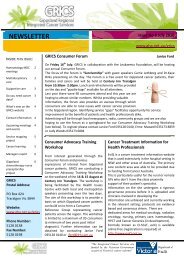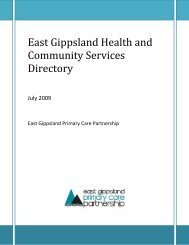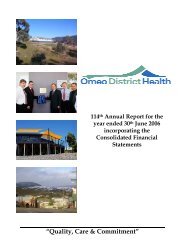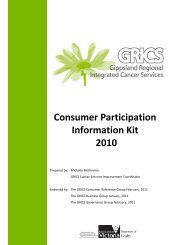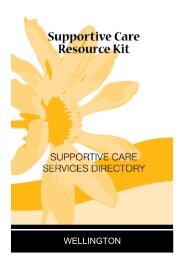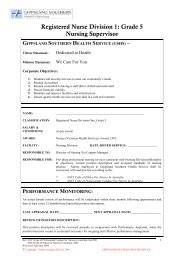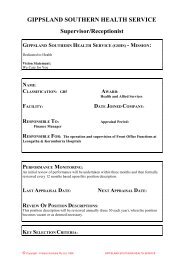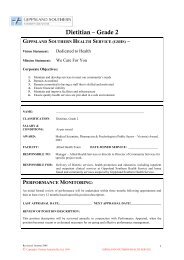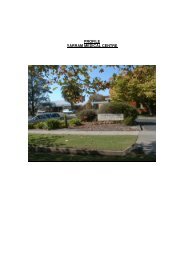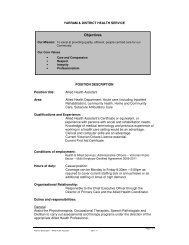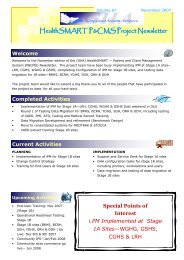HOSPITAL PATIENTS GUIDE
HOSPITAL PATIENTS GUIDE
HOSPITAL PATIENTS GUIDE
You also want an ePaper? Increase the reach of your titles
YUMPU automatically turns print PDFs into web optimized ePapers that Google loves.
This is a totally non-smoking site<br />
<strong>HOSPITAL</strong> <strong>PATIENTS</strong> <strong>GUIDE</strong><br />
2012/2013<br />
THIS DIRECTORY IS THE PROPERTY OF THE <strong>HOSPITAL</strong><br />
PLEASE DO NOT REMOVE
PATIENT INFORMATION<br />
WELCOME TO BASS COAST REGIONAL HEALTH -<br />
WONTHAGGI <strong>HOSPITAL</strong>.<br />
The Wonthaggi Hospital, as part of Bass Coast Regional Health, is staffed by a committed team of<br />
dedicated people who understand that being a patient in hospital can often be an anxious time for<br />
you, your carer, family and friends.<br />
This booklet aims at assisting you to understand the information and services you may expect during<br />
your stay. Please feel free to ask members of our staff if you have any questions or require further<br />
information.<br />
VISION<br />
Striving to achieve excellence in health care for the Gippsland South Coast.<br />
PURPOSE<br />
To plan and develop a sub regional health service that meets the primary health needs of the local<br />
community in addition to providing secondary and specialist care to the extended population of the<br />
South Coast. We are committed to work with our partners to achieve appropriate sub regional<br />
access to specialist services for the people of the South Coast.<br />
VALUES<br />
A set of values will underpin our strategic direction and our relationships with the community and<br />
our health partners:<br />
• Person Centred Focus<br />
• Integrity<br />
• Trust<br />
• Respect<br />
• Quality and Safety<br />
• Accountability<br />
• Working Together<br />
Bass Coast Regional Health, Wonthaggi 2012/5379<br />
1
PATIENT INFORMATION<br />
Wonthaggi Hospital was founded in 1910 and services the Bass Coast Shire, an area of over 860<br />
square kilometres and with a permanent population of over 30,000. The Health Service provides a<br />
comprehensive range of services including acute and sub-acute hospital services, aged residential<br />
care, community health services and a range of ancillary medical services.<br />
The Health Service is fully accredited by the Australian Council on Healthcare Standards (ACHS) and<br />
equipped to offer a broad range of specialist medical, surgical and obstetric services including<br />
orthopaedics, ophthalmology, gynaecology, paediatrics, ear nose & throat surgery, gastrocolic<br />
surgery, urology, general surgery, Geriatric Evaluation and Management program, and slow stream<br />
rehabilitation.<br />
Aged residential care services are provided in the 30-bed Armitage House Nursing Home, 30-bed<br />
Kirrak House Nursing Home both in Wonthaggi, and 29-bed Griffiths Point Lodge Hostel at San<br />
Remo. All aged residential care services are accredited through the Aged Care Standards and<br />
Accreditation Agency, and ACHS.<br />
A wide range of community-based services are provided from sites at Wonthaggi, Inverloch,<br />
Grantville, Corinella and Cowes. The Health Service also provides Meals on Wheels to all of the Bass<br />
Coast Shire community, comprehensive training programs for its staff and the community including<br />
apprenticeships, public health programs, and clinical placement programs for medical, nursing and<br />
allied health trainees.<br />
Interpreter services may be organised in advance to facilitate care requirements such as elective<br />
admission, and procedural consent.<br />
Lea Pope<br />
Chief Executive Officer<br />
Bass Coast Regional Health<br />
2
PATIENT INFORMATION<br />
What To Bring To Hospital<br />
• Medicare Card<br />
• Pharmaceutical Benefits Scheme entitlement<br />
card (if relevant)<br />
• Concession, Healthcare, Safety Net<br />
• DVA / Pension Card<br />
• Private Health Insurance details (if applicable)<br />
• Any documentation that the doctor has given<br />
you for example:<br />
- Medication Chart<br />
- Operation Consent form (if not already<br />
given at booking in)<br />
- Anaesthetic Information<br />
- X-rays<br />
- Letter / instructions<br />
If you are staying overnight:<br />
• Nightdress / pyjamas, dressing gown, and<br />
well fitting slippers<br />
• Toiletries<br />
• Small change (for newspapers and phone<br />
calls)<br />
• Phone cards can be purchased at the<br />
Administration office in the foyer for bedside<br />
telephones, or there is a public telephone in<br />
the foyer.<br />
Note: Private electrical appliances will be subject<br />
to a safety check (by the hospital) prior to use in<br />
the hospital.<br />
Valuables<br />
Please avoid bringing valuables (including<br />
watches, jewellery, etc.) or large amounts of cash<br />
into the hospital, as the Health Service does not<br />
accept responsibility for such items.<br />
If you have brought valuables in with you, they<br />
may be signed over to the staff and maintained<br />
in the safe. You will be given a receipt for the<br />
valuables to be used at the time collection.<br />
Collection of valuables can only be undertaken<br />
during office hours. If amounts of money over<br />
$50 have been signed over to the Health Service,<br />
at least one (1) business day’s notice is required<br />
to retrieve these, as cash is not kept on the<br />
premises. This arrangement is to be made via<br />
General Administration on (03) 5671 3333.<br />
ADMISSION / DISCHARGE /<br />
TRANSFER<br />
Maternity<br />
Maternity patients will need to book in at the<br />
hospital as early as possible prior to the expected<br />
birth date. Women need to have chosen their<br />
doctor from the Wonthaggi Medical Group and<br />
consulted with that doctor. Women should<br />
telephone the main reception at the hospital to<br />
book an appointment with a midwife who will<br />
discuss individual pregnancy care plans.<br />
Patient Classification<br />
Bass Coast Regional Health is a public hospital,<br />
and on admission you will be classified as one of<br />
the following care types:<br />
• Public patient (Medicare)<br />
• Private patient<br />
• Compensable patient (Workcover or TAC –<br />
claim number required)<br />
• Veterans' Affairs<br />
• Overseas patient from countries without<br />
reciprocal healthcare. Patients not covered by<br />
Medicare will be charged fees to achieve full<br />
cost recovery.<br />
3
PATIENT INFORMATION<br />
Patients with private health insurance have the<br />
choice to be treated as either a public or private<br />
patient – unless you have agreed with your<br />
surgeon to have you procedure as a private<br />
patient. We encourage you to use your private<br />
insurance if you have it because by doing so you<br />
are assisting the Health Service to maintain<br />
provision of the best care and facilities for the<br />
community we serve.<br />
If you elect to be a private patient please ensure<br />
that your health fund membership is up to date,<br />
covers your admitted procedure (if surgical), and<br />
that you have your membership card/book or<br />
details with you. It is your responsibility to be<br />
aware of your level of cover and to ensure that<br />
your membership is current.<br />
Transfer to Another Facility<br />
Sometimes it is necessary to transfer patients to<br />
another hospital, nursing home or healthcare<br />
facility. This is only done in consultation with you<br />
and your carer/family, or in emergency situations.<br />
Transfer may be by air or road ambulance, or<br />
hospital/volunteer transport service.<br />
Please check that any follow up appointments<br />
have been made and that your medication<br />
requirements have been arranged prior to<br />
discharge – refer to medication heading.<br />
Discharges normally occur before 10.00 am. If<br />
you are having a day procedure you will be<br />
discharged on the same day. You must make<br />
arrangements for someone to drive you home, as<br />
legally you are not able to drive a motorised<br />
vehicle for a minimum of 24 hours post<br />
anaesthetic. It is recommended that you have<br />
someone stay with you overnight for this postanaesthetic<br />
period.<br />
Discharge at Own Risk<br />
With few exceptions (for example in case of<br />
infectious diseases) you have the right to leave<br />
hospital when you choose. This may be a serious<br />
step when taken against the advice of your<br />
doctor and could pose a significant threat to your<br />
well-being. If you choose to be discharged under<br />
these circumstances you will be asked to sign a<br />
disclaimer form and the responsibility for this<br />
action will rest with you.<br />
Discharge<br />
Management of your treatment may continue<br />
after you leave hospital and return home. Before<br />
you are discharged the hospital will make sure<br />
that you and the relatives or friends involved in<br />
your care know how to look after you at home,<br />
and understand what is involved. Please do not<br />
hesitate to ask for treatment programs to be<br />
written out for you if you have any doubts. Your<br />
doctor or nurse will answer any questions you<br />
may have and will arrange necessary support<br />
services such as District Nursing, personal care,<br />
rehabilitation, Meals on Wheels, or Home Help.<br />
4
PATIENT INFORMATION<br />
MEDICATIONS<br />
Current Medication<br />
To help the Doctor and Pharmacist check that the<br />
right medications are given to you while in<br />
hospital, please bring all your medications from<br />
home with you. Sometimes, the medications<br />
given to you in hospital may look different to the<br />
ones used at home as the hospital may keep a<br />
different brand of medication. Your own<br />
medication, such as inhalers and eye drops may<br />
also be used if the hospital does not have these<br />
available, so please ensure you bring them with you.<br />
While in hospital, a Pharmacist may visit you to<br />
review your medications. It is important you tell<br />
the Pharmacist all the medications you take<br />
(including non-prescription and herbal<br />
medications) and any allergies or sensitivities you<br />
have to medications.<br />
The Pharmacist will help the Doctor to give you<br />
the best medication treatment available and can<br />
explain any changes to your medications that<br />
may have been made by the Doctor. The<br />
Pharmacist can also answer any questions you<br />
may have about your medications. If you would<br />
like any additional information about your<br />
medications such as a Consumer Medicines<br />
Information sheet (CMI), please ask, so that one<br />
can be supplied.<br />
Discharge Medication<br />
A medication summary may be prepared for you<br />
and this needs to be taken to your local doctor<br />
and any other follow up appointments that<br />
occur. Before leaving hospital you may be given<br />
prescriptions for up to one month's supply of<br />
medication. The prescription can be dispensed in<br />
either the hospital pharmacy (during office<br />
hours) or at your local community pharmacy.<br />
YOUR <strong>HOSPITAL</strong> STAY<br />
On arrival to the ward you will be shown to your<br />
bed. The staff will orientate you, and be happy<br />
to provide you with any information you require.<br />
All hospital staff and volunteers wear<br />
identification badges showing their name and<br />
position.<br />
If you wish to leave the ward for any reason at<br />
any time please consult with the Associate Nurse<br />
Unit Manager before leaving.<br />
Alcohol<br />
Patients and visitors are not permitted to have or<br />
consume liquor on the hospital grounds, without<br />
medical consent.<br />
Aggressive Behaviour<br />
Bass Coast Regional Health has a zero tolerance<br />
policy and aggressive and violent behaviour<br />
towards staff or other patients will not be<br />
tolerated. Should this occur the Police will be<br />
called and legal action may be initiated.<br />
Comments, Compliments and<br />
Complaints<br />
We invite any comment you may have about<br />
your stay in hospital. Our staff will endeavour to<br />
solve any problems quickly. We encourage you<br />
to speak to the staff or the Nurse Unit Manager<br />
of your ward, or alternatively you may wish to<br />
speak to the Director of Nursing Services.<br />
Comments, Compliment, and Complaints forms<br />
and a suggestion box are available in the main<br />
hospital foyer as another option for feedback.<br />
Any member of the public can contact the Health<br />
Services Commissioner. (HSC) on (03) 8601 5200<br />
(toll free 1800 136 066).<br />
5
PATIENT INFORMATION<br />
The HSC will listen to complaints and advise how<br />
they may be resolved. The Health Service does<br />
request that you raise any issues locally prior to<br />
accessing the Health Services Commissioner.<br />
Consent<br />
By coming to hospital you have implied consent<br />
to treatment. Certain procedures such as<br />
operations, the administration of anaesthetics<br />
and some tests may require your specific consent<br />
in writing. You will be advised of this. It is<br />
important that you understand and are fully<br />
informed of what is involved before you give<br />
consent. We encourage you to participate fully<br />
in decisions made about your treatment and ask<br />
any questions that you may have.<br />
Day Leave<br />
Day leave is when a patient currently admitted to<br />
the hospital has a requirement to leave for any<br />
reason (not including transfer), with the intention<br />
of returning either the same or next day. This is<br />
an unusual circumstance given the demand for<br />
hospital beds, and is only done in special<br />
circumstances, in negotiation with the treating<br />
Doctor, and Nurse Unit Manager.<br />
Emergency Procedures<br />
All hospital staff are trained in emergency<br />
procedures. In the event of fire or other<br />
emergency, remain by your bed and wait until a<br />
staff member advises you what to do.<br />
Laundry<br />
Please note that the hospital does not provide a<br />
personal laundry service.<br />
Mail<br />
Incoming mail is delivered to your bedside daily.<br />
Ward staff will assist you with outgoing mail if<br />
necessary.<br />
Nurse Call System<br />
If you require assistance do not hesitate to alert<br />
the nursing staff by using the call button located<br />
near your bed.<br />
Activities undertaken during this period of<br />
absence from the Health Service are at the<br />
patient’s own risk.<br />
Patients who do not return to the Hospital by the<br />
agreed time and have not contacted the Nurse<br />
Unit Manger or After Hours Co-ordinator to<br />
inform of potential delay, will be considered<br />
discharged.<br />
6
PATIENT INFORMATION<br />
Smoke Free Policy<br />
Bass Coast Regional Health is a smoke free<br />
organisation, in line with its role of health<br />
promotion and illness prevention.<br />
Smoking is not allowed anywhere on the<br />
Wonthaggi Hospital site for patients, visitors, or<br />
staff.<br />
A range of supports are available to inpatients,<br />
including nicotine chewing gum and patches.<br />
There is also QUIT literature available for your<br />
reference in the foyer or at www.quit.org.au<br />
Telephone<br />
For your convenience a public telephone is<br />
located in the main foyer of the hospital.<br />
Patients in the acute wards may purchase a<br />
phone card from main reception between 9 AM<br />
and 5 PM, Monday to Friday, and from Ward<br />
Clerks at other times. This will allow calls to be<br />
made from the bedside telephones.<br />
Witness to Legal Documents<br />
Bass Coast Regional Health does not permit staff<br />
to witness legal documents for patients or<br />
visitors. The organisation would prefer that staff<br />
not be requested to witness legal documents and<br />
that you arrange this through your Solicitor.<br />
Volunteer Activities<br />
For patients who do not have family or other<br />
external social supports Volunteer visitors usually<br />
attend the ward Monday to Saturday. If required<br />
they may be available to purchase small items<br />
(such as toiletries) from the local shopping centre<br />
for patients.<br />
FOOD SERVICES<br />
The Food Service Department strives to provide<br />
you with meals that are healthy, nutritious, and<br />
as appetising as possible.<br />
We ask that you do not use mobile phones<br />
within the patient rooms of the hospital as these<br />
can interfere with the delicate monitoring<br />
equipment.<br />
Television & Radios<br />
Some wards provide TV facilities. TV controls are<br />
located in the Nurse Call Handset. Radios must<br />
be equipped with an earpiece at all times to<br />
minimise discomfort to other patients.<br />
7
PATIENT INFORMATION<br />
Ordering Meals<br />
A Food Service Assistant will come to you in the<br />
afternoon, and can answer any questions you<br />
have about the menu and will write down your<br />
choices for breakfast, lunch and dinner.<br />
Food Services can provide for most dietary<br />
requirements, but it is imperative that hospital<br />
staff are notified of the details.<br />
Helpful Hints for Ordering Meals<br />
• You can order smaller or larger meals<br />
depending on your appetite.<br />
• When ordering cereal, please specify hot or<br />
cold milk.<br />
• Low fat milk is used in all cooking and<br />
beverages.<br />
• An artificial sweetener is available upon<br />
request.<br />
• Fresh fruit in season is available at all meal<br />
times.<br />
• Assorted sandwiches include: cheese, egg,<br />
tuna and various salad items. Four points is a<br />
standard serve. White or wholemeal bread is<br />
available - all white bread is high fibre unless<br />
otherwise requested.<br />
Dietary Information<br />
The Dietitian is happy to advise and assist on any<br />
aspect of your diet. Please ask your Health<br />
Professional for a referral. The hospital can cater<br />
for a wide range of dietary needs. If you have<br />
special dietary requirements or have any food<br />
allergies or intolerances, please let the Nursing<br />
staff know when you book in or are admitted to<br />
hospital.<br />
Meeting a patient’s nutritional requirements is an<br />
essential component for achieving an optimal<br />
recovery. Visitors are requested to refrain from<br />
visiting during meal times unless assisting a<br />
patient with their meal requirements.<br />
Approximate Meal Times<br />
8:00 AM Breakfast<br />
10:00 AM Morning Tea<br />
12:30 PM Lunch<br />
3:45 PM Afternoon Tea<br />
5:00 PM Dinner<br />
8:15 PM Supper<br />
• Over-bed trolleys are positioned by nursing<br />
staff only. Please ensure that they are clear<br />
prior to your meal. Meal trays are collected<br />
approximately thirty minutes after the meal<br />
has been served.<br />
• Fridges and microwaves are available in the<br />
ward pantries for patients. Any food stored in<br />
the fridge must be labelled and dated, and<br />
will be disposed of 2 days (post dating), or at<br />
discharge.<br />
It is not Bass Coast Regional Health Policy to<br />
provide food and beverages to visitors.<br />
8
South Gippsland Family Medicine<br />
Same Day Consultation Available<br />
Phone 5672 4111<br />
BULK BILLING<br />
FOR ALL MEDICARE ITEMS<br />
CONSULTING HOURS<br />
MONDAY TO FRIDAY 8.00AM TO 5.30PM<br />
WEDNESDAY LATE CLINIC TIL 7.30PM<br />
SERVICES AVAILABLE:<br />
• Family Medicine • Preventative Care<br />
• Minor Surgical Procedures • Aged Care • Immunisations<br />
• Skin Checks • Visiting Allied Health Professionals<br />
4-6/1 Billson Street, Wonthaggi 3995<br />
Accredited to RACGP General Practice Standards<br />
“Caring Family Medicine”<br />
PLASTERERS<br />
Happy to support<br />
The Wonthaggi Hospital<br />
and local Community<br />
• DOMESTIC & COMMERCIAL<br />
• WALLS, CEILINGS & PARTITIONS<br />
• ACOUSTIC & FIRE RATED<br />
Loughran Drive, Wonthaggi Vic<br />
Ph: 5672 2497<br />
Mob: 0412 304 442<br />
Email: sceilings@optusnet.com.au<br />
RENDERS AND<br />
TEXTURES<br />
•Servicing Bass Coast<br />
Regional Health<br />
• Business Enquiries<br />
very welcome<br />
Become a<br />
blood<br />
donor<br />
at your nearest<br />
Red Cross Blood Bank<br />
14 Loughran Drive<br />
Wonthaggi VIC 3995<br />
5672 5302
PATIENT INFORMATION<br />
Meals-On-Wheels Information<br />
A referral for Meals-On-Wheels may be made for<br />
you by your Doctor or Nursing staff. Meals will<br />
commence on the day after you have been<br />
discharged from hospital. You will be contacted<br />
by the Meals on Wheels Co-ordinator within 14<br />
days to complete the assessment process<br />
required for Meals on Wheels.<br />
The meal includes a main course, sweets and<br />
fruit juice. The meals are delivered chilled by a<br />
Volunteer and will usually arrive at your house by<br />
12 noon. Accounts are sent out by the Accounts<br />
Department at the end of every month, arriving<br />
around the 10th day of the following month.<br />
Please ask for the Food Services Manager if you<br />
have any queries, requests or comments about<br />
the food service provided.<br />
We hope you enjoy your meals whilst in hospital.<br />
HEALTH INFORMATION AND<br />
PRIVACY<br />
Bass Coast Regional Health maintains a<br />
confidential record of your health information.<br />
Access to this information is restricted to<br />
healthcare professionals who are directly involved<br />
in your treatment and Health Information staff.<br />
Your medical record remains the property of Bass<br />
Coast Regional Health.<br />
Why Do We Collect your<br />
Health Information?<br />
Information about your health is recorded in your<br />
medical record for the purposes of planning your<br />
care and treatment. The medical record contains<br />
your name, address, contact details and other<br />
information such as the problem for which you<br />
seek treatment and the treatment and advice you<br />
were given. This information is collected and<br />
updated by healthcare professionals every time<br />
you seek treatment.<br />
To safeguard your own health we ask that you<br />
provide us with accurate and complete<br />
information. Withholding relevant information<br />
may put your health at risk.<br />
What Happens To Your Health<br />
Information?<br />
Information about your health is recorded in a<br />
paper medical record, which is confidentially<br />
maintained and securely stored. Information is<br />
also stored on our computer system. This means<br />
that information about you is available in paper<br />
file and electronically, to the healthcare<br />
professionals at Bass Coast Regional Health that<br />
are involved in your care. This allows the<br />
involved healthcare staff fast and accurate access<br />
to your health information.<br />
In an emergency situation we will release<br />
personal information about you to facilitate your<br />
care in accordance with the guidelines of the<br />
Health Services Commissioner.<br />
In non-emergency situations, a consent form to<br />
share your personal information with other<br />
agencies involved in your ongoing care is<br />
required.<br />
When you go home from hospital we will send a<br />
Discharge Summary to your local doctor if you<br />
agreed to this on admission. This summarises<br />
your stay in hospital, your medication and any<br />
special instructions we need your doctor to<br />
know. If you do not wish this information to be<br />
sent to your doctor please let your nurse know as<br />
soon as possible. We may also share information<br />
relevant to your ongoing care with community<br />
groups that are providing you with support.<br />
11
PATIENT INFORMATION<br />
These may include Meals-On-Wheels, District<br />
Nursing, your nominated community pharmacy<br />
and other support services.<br />
In some circumstances, Bass Coast Regional<br />
Health is obligated by law to release personal<br />
information about you. For example, we report<br />
notifiable diseases to the Department of Health<br />
and all cancers to the Anti-Cancer Council of<br />
Australia. De-identified data is sent to the<br />
Department of Health, as a requirement of all<br />
public hospitals.<br />
Information is only made available for research<br />
projects, which have been approved by an Ethics<br />
Committee. Individuals who carry out research<br />
must follow strict guidelines and maintain<br />
confidentiality of the information that they<br />
access.<br />
No personal, identifiable information apart from<br />
that described will leave the Health Services<br />
without prior consent.<br />
How do we protect your<br />
health information?<br />
Everyone working at Bass Coast Regional Health<br />
has a legal duty to keep information about you<br />
confidential. We only pass on information about<br />
you if authorised by you or by law. Whenever<br />
possible, details which identify you are removed.<br />
Any person or organisation that receives<br />
information from us has a legal duty to keep it<br />
confidential. The Health Records Act 2001 (VIC)<br />
came into effect in July 2002 and Bass Coast<br />
Regional Health has processes in place to meet all<br />
requirements of this Act. Information relating to<br />
this Act and more general privacy considerations<br />
can be found at www.dhs.vic.gov.au/privacy<br />
How can you access your<br />
health information?<br />
Under the Freedom of Information Act you have,<br />
in most circumstances, the right to access your<br />
medical record and the right to amend it if<br />
necessary. Requests to access your medical<br />
record can be made in writing to the<br />
Organisation’s Freedom of Information Officer.<br />
Charges will apply.<br />
Postal address on page 17.<br />
TIPS FOR SAFER HEALTH CARE<br />
1. Be actively involved with your own health<br />
care.<br />
Take part in every decision to help prevent<br />
things from going wrong and get the best<br />
possible care for your needs.<br />
2. Speak up if you have any questions or<br />
concerns.<br />
Ask questions. Expect answers that you can<br />
understand. Ask a family member, carer or<br />
interpreter to be there with you if you want.<br />
3. Learn more about your condition or<br />
treatments.<br />
Collect as much reliable information as you<br />
can. Ask your health care professional:<br />
• What should I look out for?<br />
• Please tell me more about my condition,<br />
tests and treatment.<br />
• How will the tests or treatments help me<br />
and what is involved?<br />
• What are the risks and what is likely to<br />
happen if I don't have this treatment?<br />
12
PATIENT INFORMATION<br />
4. Keep a list of all the medicines you are taking.<br />
Include:<br />
• prescriptions, over-the-counter and<br />
complementary medicines (e.g. vitamins<br />
and herbs); and<br />
• information about drug allergies you<br />
may have.<br />
5. Make sure you understand the medicines you<br />
are taking.<br />
Read the label, including the warnings.<br />
Make sure it is what your doctor ordered for<br />
you.<br />
Ask about:<br />
• directions for use;<br />
• possible side effects or interactions; and<br />
• how long you'll need to take it for.<br />
6. Before you leave hospital, ask your health<br />
care professional to explain the treatment<br />
plan you will use at home.<br />
Make sure you understand your continuing<br />
treatment, medicines and follow-up care.<br />
Visit your GP as soon as possible after you are<br />
discharged.<br />
Tips for Safer Health Care<br />
www.safetyandquality.gov.au<br />
information at<br />
CHARTER OF HEALTH CARE<br />
RIGHTS<br />
Bass Coast Regional Health acts in line with the<br />
Australian Charter of Healthcare Rights for<br />
Victoria. Further information is available at:<br />
http://www.health.vic.gov.au/patientcharter/<br />
Or<br />
You have the RIGHT to:<br />
Access – a right to access health care.<br />
Safety – a right to receive safe and high quality<br />
health care.<br />
Respect – a right to be shown respect, and to be<br />
treated with dignity and consideration.<br />
Communication – a right to be informed about<br />
services, treatment, options and costs in a clear<br />
and concise way.<br />
Participation – a right to be included in decision<br />
and to make choices about your health care.<br />
Privacy – a right to privacy and confidentiality of<br />
your personal information.<br />
Comment – a right to comment on your<br />
healthcare, and to have your concerns<br />
addressed.<br />
STRATEGIES TO MAXIMISE<br />
YOUR HEALTHCARE<br />
EXPERIENCE:<br />
• Be aware of your rights.<br />
• Work with the treating team by providing<br />
relevant information about your health or any<br />
circumstances that may influence your<br />
treatment, recovery, or stay in hospital.<br />
• Ask questions about your treatment if you do<br />
not understand.<br />
• Participate and follow your prescribed and<br />
agreed treatment.<br />
• Convey your needs to Bass Coast Regional<br />
Health staff, wherever able.<br />
• Alert Bass Coast Regional Health staff to<br />
concerns that you may have with your<br />
prescribed treatment, wherever able.<br />
http://www.safetyandquality.gov.au/<br />
13
PATIENT INFORMATION<br />
• Inform Bass Coast Regional Health staff if<br />
your condition changes.<br />
• Keep your appointment time or advise staff if<br />
you need to change an appointment.<br />
• Be an active partner in treatment decisions<br />
wherever possible.<br />
• Take care of your personal belongings and<br />
money.<br />
• Be considerate of staff and other patients,<br />
respecting beliefs, religion, community and<br />
cultural differences and ask your visitors to do<br />
the same.<br />
• Understand the Health Service has a Zero<br />
Tolerance policy with respect to violent or<br />
aggressive behaviour to staff, patients, or<br />
visitors in consideration of everybody’s safety.<br />
VICTORIAN PATIENT<br />
SATISFACTION MONITOR<br />
We invite you to participate in the Victorian<br />
Patient Satisfaction Monitor (VPSM). The VPSM is<br />
a study that measures patients' satisfaction with<br />
their hospital stay. Results from the study help<br />
hospitals to identify ways that they can improve<br />
services for patients. Bass Coast Regional Health<br />
continuously participates in the VPSM, which is<br />
conducted across Victoria and is sponsored by<br />
the Department of Health.<br />
If you agree to participate in the VPSM, you may<br />
be one of the people who receive a survey in the<br />
mail after discharge from hospital. Bass Coast<br />
Regional Health will send your name, address<br />
and preferred language to Ultra Feedback, an<br />
independent research company that has been<br />
appointed to send out and collect the survey.<br />
Your name and personal details will only be used<br />
to contact you for the survey and will not be used<br />
for any other purpose. After the survey and a<br />
thank you letter have been sent out, any record<br />
of your name and personal details will be<br />
destroyed.<br />
If you receive a questionnaire, you will have the<br />
opportunity to answer questions about how you<br />
felt about your stay in hospital.<br />
As your participation is anonymous, you will not<br />
be sent a copy of the survey findings. A report of<br />
the survey results will be sent to Bass Coast<br />
Regional Health every six months and an annual<br />
statewide report is publicly available on the<br />
internet at: www.health.vic.gov.au/patsat or by<br />
contacting the Department of Health on 1800<br />
356 601.<br />
You do not have to take part in this survey.<br />
Participation is entirely voluntary. You can<br />
withdraw from the study by:<br />
• completing a Refusal To Participate form,<br />
available from the Admissions Clerk, and<br />
leaving it with hospital staff; or<br />
• by not returning the questionnaire.<br />
Your privacy will be protected at all times and<br />
your participation, or non-participation in this<br />
survey will not influence any future hospital<br />
treatment you may require.<br />
Thank you for your assistance and co-operation.<br />
VISITORS AND VISITING HOURS<br />
Enquiries<br />
Telephone enquiries from relatives and friends<br />
regarding a patient's condition should be made<br />
on (03) 56713333 between the hours of 9 AM<br />
and 8 PM.<br />
14
PATIENT INFORMATION<br />
Visitors<br />
Please help us to provide the best care by asking<br />
your visitors to visit between 2 PM and 8 PM<br />
each day. It is important that a patient's privacy<br />
and dignity is respected whilst they receive<br />
treatment. If unable to visit during these times<br />
please discuss with the nursing staff and a<br />
suitable visiting time may be negotiated.<br />
Visitor Services<br />
Vending machines are located in the main foyer<br />
of the hospital, where tea, coffee, cold drinks<br />
and snacks can be purchased. Lounge facilities<br />
are available in the main ward areas. In<br />
consideration of other patients, if you have more<br />
than 2 visitors, please utilise the lounge facility<br />
rather than your bed area whenever possible.<br />
A public telephone and toilets are located in the<br />
main foyer of the hospital. If people are using<br />
mobile phones in the lounge or public areas of<br />
the hospital please have the tone set to silent,<br />
and minimise volume of conversations in the<br />
interest of unwell patients.<br />
A baby change table is available in the female<br />
public toilet off the main foyer.<br />
Car Parking<br />
Car parking is available on the hospital grounds<br />
and is free of charge. Disabled parking spaces<br />
are located close to entrances.<br />
COMMUNITY SERVICES<br />
Bass Coast Regional Health provides the<br />
following community based services to the<br />
residents of Bass Coast Shire:<br />
Asthma Education<br />
Activiites Programs<br />
Breast Care<br />
Cardiac Rehabilitation<br />
Chaplaincy /Pastoral Care Program<br />
Continence Nurse<br />
Dental<br />
Diabetes Educator<br />
Dietetics<br />
District Nursing<br />
Early Intervention Chronic Disease Management<br />
Family Day Care<br />
Family Services<br />
Financial Counsellors<br />
Hospital Admission Risk Program<br />
Meals on Wheels<br />
Occupational Therapy<br />
Palliative Care Service<br />
Physiotherapy<br />
Podiatry<br />
Pulmonary Rehabilitation<br />
General Rehabilitation<br />
Sexual Assault Support Program<br />
Social Work<br />
Speech Pathology<br />
Stomal Therapy<br />
Transition Care Program<br />
Volunteer Servies<br />
Youth Support Services<br />
Welfare Services<br />
Bereavement Support Service<br />
15
PATIENT INFORMATION<br />
Minimal fees may apply to some community<br />
based services.<br />
For further information, contact Bass Coast<br />
Regional Health during office hours on:<br />
Telephone: (03) 5671 3333<br />
Facsimile: (03) 5671 3300<br />
Falls Prevention<br />
Falls prevention is a key concern at Bass Coast<br />
Regional Health, and the aim is to maintain your<br />
safety, independence, and confidence.<br />
All patients are given a comprehensive<br />
assessment on admission, and falls risks are a<br />
part of this process. Strategies specific to your<br />
requirements are then integrated into your plan<br />
of care to minimise the risk of a fall.<br />
Your risk of falls is often high on admission, due<br />
to a combination of your current condition and<br />
the change in environment. Fortunately there<br />
are simple steps that you, your carer/ family/<br />
friends, and the staff can take to prevent the<br />
likelihood of a fall.<br />
One of the visible strategies used at Bass Coast<br />
Regional Health is the colour orange. Orange<br />
wrist bands and an orange ‘ falling star’ symbol<br />
in a bed area are sometimes used to assist staff in<br />
the need to keep patient areas clear, or to offer<br />
that little bit extra support when ambulating.<br />
Factors influencing the risk of falls are:<br />
• Nutrition<br />
• Mobility (prior falls, general health, and<br />
physical condition)<br />
• Continence<br />
• Cognition<br />
- Depression<br />
- Delirium<br />
- Dementia<br />
• Environment (particularly a change in<br />
environment)<br />
• Medications<br />
Things for you to consider:<br />
• Keep the space around your bed free of<br />
unnecessary clutter as this can be a tripping<br />
hazard.<br />
• If you have been prescribed a walking aid or<br />
other aid to assist in you independence, use<br />
them as these are for your safety.<br />
Inform staff if you previously relied on walking<br />
aids or specialised equipment such as chairs or<br />
showering aids.<br />
• When you first arrive, or post a procedure you<br />
may be unsteady on your feet. Ask for<br />
supervision until you are safer, or it may be<br />
necessary to use a walking aid.<br />
• If rushing to the toilet is a problem, let the<br />
staff know so a toilet regimen or other<br />
strategies can be established.<br />
• Tell the staff if you think existing or new<br />
medications are causing side effects,<br />
particularly dizziness, or unsteadiness on your<br />
feet. Report any episodes of dizziness that<br />
may occur.<br />
• Take the opportunity for supervised physical<br />
activity while on the ward as this helps with<br />
gradual improvement in strength and<br />
balance.<br />
• Ensure that you or your family bring in<br />
appropriate fitting slippers/shoes as they are<br />
essential for safe walking.<br />
16
PATIENT INFORMATION<br />
• Ensure that dressing gowns and clothing are<br />
not too long.<br />
• Wear your spectacles as needed, and report<br />
any changes in your vision which might make<br />
it difficult to move around safely.<br />
Things not to do:<br />
• Walk in socks.<br />
• Get out of bed unassisted if recently<br />
admitted, feeling unwell, after having pain<br />
medication, or post procedure.<br />
• Use the furniture or over-bed table as a<br />
walking aid.<br />
• Think that you do not want to bother the<br />
nurse.<br />
Bass Coast Regional health has a variety of<br />
equipment available to assit in preventing you<br />
from falling. Some of this equipment may be<br />
available via short term rental if needed for your<br />
initial convalescence at home.<br />
Some interventions are single patient use and are<br />
available for your purchase, use in hospital and to<br />
take home post discharge.<br />
• Hip protectors – two pairs of underwear, and<br />
a set of hip protector inserts.<br />
• Non-slip socks.<br />
Please enquire with the Nurse Unit Manager<br />
about these products.<br />
SUPPORTING YOUR HEALTH<br />
SERVICE<br />
The Health Service is indebted to our community<br />
for your ongoing support, and relies heavily upon<br />
the generosity of the community to maintain our<br />
high levels of patient care.<br />
There are many ways you can continue to help:<br />
• By joining our Volunteer Support Group.<br />
• Through fundraising and other activities.<br />
• By joining the Ladies Auxillary.<br />
Volunteer Services<br />
We have an enthusiastic, friendly team of<br />
volunteers who provide many patient support<br />
activities. Please contact the Volunteer<br />
Coordinator on (03) 5671 3278 for information<br />
on how to become part of our team.<br />
Donations<br />
The needs of a growing community demand that<br />
more health services and resources be made<br />
available in the future. To meet such needs Bass<br />
Coast Regional Health requires ongoing<br />
community support for our continuing capital<br />
development and to purchase items of<br />
specialised equipment.<br />
Donations can be directed to the:<br />
Chief Executive Officer<br />
Bass Coast Regional Health<br />
Reply Paid<br />
PO Box 120<br />
Wonthaggi 3995<br />
All donations $2 and over are tax deductible. A<br />
receipt can be provided upon request.<br />
For further information please speak with the<br />
Nurse Unit Manager or our Chief Executive<br />
Officer.<br />
Donations may also be left to the health service<br />
in the form of a bequest.<br />
17
PATIENT INFORMATION<br />
Bed Gym<br />
(Reproduced courtesy Southwest Healthcare and<br />
Ballarat Health Services)<br />
By doing some regular moving and exercises you<br />
can help your recovery and prevent complications<br />
occurring as a result of being less active whilst in<br />
hospital.<br />
Being in hospital often means you are less mobile<br />
than normal due to illness, surgery or treatment.<br />
This can put you at risk of complications such as:<br />
• Pressure ulcers (also known as pressure sores)<br />
are damage to the skin or underlying tissue,<br />
due to lying or sitting in one position for too<br />
long. They usually occur over bony areas<br />
especially heels and buttocks.<br />
• Deep vein thrombosis (DVT): Blood clots in<br />
the deeper veins of the legs and pelvis,<br />
associated with slowing down of the blood<br />
flow due to inactivity.<br />
• Chest infection/pneumonia can occur due to<br />
a lack of deep breathing and coughing that<br />
comes naturally with activity and exercise.<br />
Prior to undertaking the following, it is important<br />
that you check with your nurse or physiotherapist<br />
whether it is appropriate for you to undertake<br />
these activities without assistance.<br />
What you can do to help:<br />
1. Go for a walk every couple of hours.<br />
If you are able, this is the single most<br />
important thing you can do.<br />
2. If unable to walk, change your position every<br />
1-2 hours.<br />
From your back to side or from in bed to<br />
sitting out.<br />
3. If sitting out of bed, change the weight on<br />
your bottom every 15 minutes.<br />
By leaning forward or side-to-side. Avoid<br />
sitting too long.<br />
Use equipment or aids to help reduce<br />
pressure whilst lying or sitting.<br />
e.g. special mattresses, foam wedges to keep<br />
your heels off the mattress.<br />
4. Move your legs every hour.<br />
Lift each leg up a few centimetres off the<br />
mattress 10 times per hour.<br />
Point your toes down towards the end of the<br />
bed and then pull them back towards the<br />
ceiling 10 times per hour.<br />
5. Deep breathing and coughing exercises.<br />
• Take 5 deep breaths, holding breath for<br />
2 seconds at the end of each inspiration.<br />
• Breath normally for five breaths.<br />
• Take another 5 deep breaths, holding<br />
breath for 2 seconds at the end of each<br />
inspiration.<br />
• Huff.<br />
• Cough.<br />
• Breath normally.<br />
It would be optimal to do these at least 2 hourly<br />
during the day if able.<br />
Support your abdomen with a pillow if necessary<br />
and cough or huff to help expel any secretions in<br />
your lungs.<br />
It is very important that you ask for pain relief if<br />
you need to move, deep breathe or cough.<br />
6. Check your skin every day.<br />
Report any redness or tenderness in any areas<br />
prone to pressure, such as bottom, base of spine,<br />
heels elbows, knees or hips.<br />
19
PATIENT INFORMATION<br />
Report any redness, swelling or tenderness in<br />
your legs.<br />
Look after your skin (avoid massage, use mild<br />
soap & moisturise).<br />
7. Maintain a healthy diet and adequate fluids.<br />
Check with care staff, relating to your particular<br />
reason for hospitalisation prior, to undertaking<br />
these exercises.<br />
Going Home (Your Discharge<br />
Checklist)<br />
You can expect to be involved in the preparation<br />
and planning for going home. An expected date<br />
of discharge may have been given to you on<br />
admission. You should be aware that this date<br />
may be bought forward or delayed, depending<br />
on your medical condition. We believe when<br />
your health permits you should be able to go<br />
home.<br />
✓ Discharge Date:<br />
Discharge Time is 10AM<br />
Transport home arranged<br />
✓ Arrangements for a care giver (family or<br />
friend) to support you at home.<br />
✓ Discharge medications – make sure that<br />
you understand what medications you are<br />
taking and how to take them.<br />
Check that you have enough medication until<br />
you see your doctor next.<br />
Ensure that you have any medications that<br />
you brought into hospital with you, and that<br />
you are still taking.<br />
✓ Organise any equipment such as crutches,<br />
walking frame, shower chair, or over toilet<br />
seat. Bass Coast Regional Health<br />
only supplies equipment for short term use.<br />
✓ Discuss with your nurse any services<br />
needed such as, Meals On Wheels,<br />
showering/personal care assistance, Home<br />
Help, District Nursing or Transition Care.<br />
✓ Follow-up appointments with your Doctor<br />
and/or Allied Health Staff.<br />
✓ Contact Number of the person who is<br />
picking you up from hospital.<br />
✓ X-rays are your property, and a vital key to<br />
your health plan. Please ensure that you have<br />
them to take home, as you will need them for<br />
doctor’s appointments.<br />
20
COMMITED TO SERVING THE SOUTH<br />
GIPPSLAND AND BASS COAST REGIONS<br />
Collection Centre Hours Centre<br />
FOSTER MON – FRI 8.30am – 10.00am, 11.00am – 12.30pm<br />
102 Station Street 2.00pm – 4.00pm<br />
5682 1319 SAT 9.00am – 11.30am<br />
INVERLOCH MON – FRI 8.30am – 10.30am<br />
14 Reilly Street.<br />
5674 3460<br />
KORUMBURRA MON – FRI 8.00am – 1.00pm, 2.30pm – 4.00pm<br />
50 Radovick Street<br />
5655 2934<br />
LEONGATHA MON – FRI 8.30am – 4.30pm<br />
Gippsland Southern SAT 9.00am – 10.30am<br />
Health Service<br />
5667 5573<br />
WONTHAGGI MON – FRI 8.30am – 4.30pm<br />
Bass Coast<br />
Regional Health SAT 9.00am – 10.30am<br />
5671 3292<br />
WONTHAGGI MON – FRI 8.30am – 12.30pm, 1.00pm – 4.30pm<br />
42 Murray Road<br />
5672 5098<br />
YARRAM MON – FRI 8.30am – 11.00am, 12.30pm – 2.25pm<br />
121 Commercial Road<br />
5182 0269<br />
LEONGATHA LABORATORY WONTHAGGI LABORATORY<br />
Phone: 5667 5573 Phone: 5671 3292<br />
YOUR LOCAL PATHOLOGY SERVICE<br />
est. 1988


